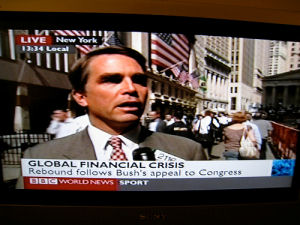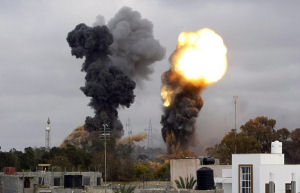
American Conservatives in Crisis?: a Q&A with Oxford’s Gillian Peele
Only three years ago, pundits and political scientists saw the 2008 American presidential election as the beginning of a new era in Washington: the rise of President Obama and a strong Democratic majority in both houses of Congress meant that after eight years away from Pennsylvania Avenue, liberals could again implement political programmes and reforms free from Republican meddling. It provided an opportunity for a fresh progressive platform and created a new mood unlike any since the early years of the Clinton administration, or maybe since the dawn of the Great Society in the 1960s. The conservatives, meanwhile, were in despair; heavy losses darkened the mood and they saw Obama as a charismatic leader who would be difficult to beat, …

Political Paralysis: Reflections on the Republican Party’s Hold on America
Big vs. small government, Blue vs. Red states, the Union vs. the Confederacy: each of these pairings represents different iterations on a recurring theme in the history of American politics. Now, more than ever in recent memory, these competing ideologies are emerging as polar opposites that threaten to drive the US political establishment into a stalemate. For progressives, there is the warranted fear that this deadlock is quickly devolving into a zero-sum game, in which the extreme conservatism of the Right has already won. As I watched the Tea Party-sponsored Republican debate, I was disturbed by the lack of compassion for the disadvantaged touted by several of the candidates, Ron Paul in particular. Bolstered by applause from the audience, …
Visibility, seeing and displacement: on the work of the photographer Miki Kratsman
On the 31 July 2011, photographer Miki Kratsman, head of the photography department of the Bezalel Academy of Art and Design, learnt that he was the recipient of the EMET Prize for Art, Science and Culture awarded by the Prime Minister of Israel. Kratsman expressed his surprise (http://www.haaretz.co.il/hasite/spages/1239559.html): “when a minister like Liebermann is in office, and people understand his logic and do not go out to the streets and protest against the horrible things he does, I am awarded with a prize”. There is, indeed, a sharp opposition between the brutality and ruthlessness of the current Israeli government, Kratsmans’ bold interventions into the seemingly stable status quo, and the decision to award him a with prize. In a long …
The elephant in the tent: social and political justice, Tel Aviv, August 2011: a response to Or Rosenboim
Tel Aviv has known many hot summers in its history. But 2011 will probably be remembered as an exceptionally burning summer, one in which the city was flooded by tents occupied by young middle class residents, protesting against the rise in the cost of living. As Or Rosenboim argues, these protests were characterised by the claim to “go beyond the political”, to ask for social justice, referring to the colloquial distinction between issues relating to security and defence, and particularly, the Israeli-Palestinian conflict, regarded as “the political”, and “the social”. I wish to argue that these protests are closely interlinked to questions of foreign policy even though they put in much time and effort to avoid them. In a video …
Why Reinhold Niebuhr?
Pardon the self-promotion: I reviewed a new book on Reinhold Niebuhr, a theologian and realist political thinker during the Cold War, in last week’s Economist. Niebuhr died in the 1970’s but both Democrats and Republicans lean on his advice (even if misread) to guide their modern foreign policy views. Here is a snippet from my review of the book, Why Niebuhr Now?, by John Patrick Diggins, the late American intellectual historian. AFTER years in the doldrums, Reinhold Niebuhr, an American theologian, is enjoying a comeback. Although Niebuhr died in 1971, he is nowadays often name-dropped in opinion columns and highbrow chat as the ideal mind to help guide 21st-century political leaders through the ups and downs of world affairs. It …
Ideology in Dance
As regular denizens of Oxford’s Centre for Political Ideologies (a research centre in the DPIR) know, unlike most branches of political theory and political philosophy, studying ideologies requires more than unpacking the canonical texts of great thinkers. Not always bad things (like totalitarianism or fundamentalism), ideologies occupy the space between ivory tower ideas and day-to-day politics and thus come in many forms – speeches, slogans and sermons. But even ideology-focused students, including your blogger, forget to look for political messages in more creative spaces. Like dance. Luckily this is what my Dphilling colleague Dana Mills, an accomplished dancer herself, focuses on most. Dana always urges me to look at the similarities between my word heavy work on liberalism and the …

Nation States, Capitalism and the Crisis
Numerous questions pose themselves for political economists about the crisis – enough (never waste a good crisis) to keep PhDs engaged for a generation. But in my view there are two big picture questions which modern comparative political economy needs to answer. One is why the epicentre of the crisis was in Wall Street and the City of London. The other is this: the crisis occurred as a result of failures in the main regulatory frameworks – the financial and the macroeconomic – which govern much of the workings of advanced economies. Why, in sharp contrast to the 1930s, have these frameworks changed little since the crisis? These questions raise major issues for our understanding of modern capitalism and its …

Which Entity is the Government of Libya and Why does it Matter?
In the past couple of days, Germany and Canada have joined the group of countries that have declared that they consider the National Transitional Council (NTC) in to be the “legitimate representative” of the Libyan people. But what exactly does this mean? According to the BBC, the group of countries extending this recognition includes France, the UK, Italy, Spain, Germany, the UAE, Qatar, Jordan, Gambia, Senegal and Australia. Russia and the United States have had meetings with the NTC and have also made similar declarations about the illegitimacy of the Gaddafi regime and about the legitimacy of the NTC (see previous post by Stefan Talmon on the US position in March). What are the legal implications, if any, of these …









